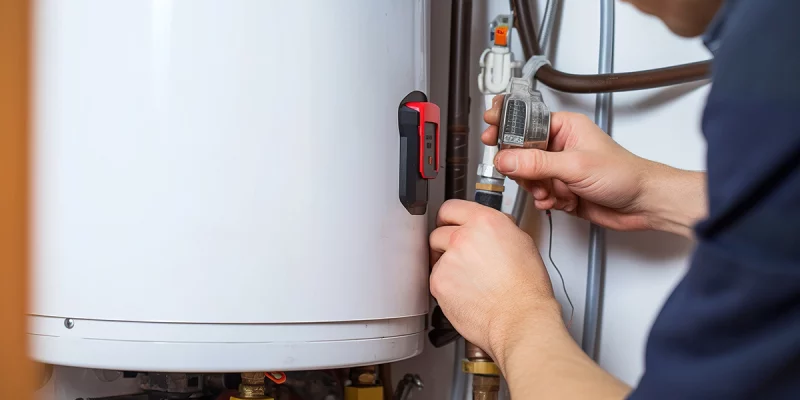It’s a scenario familiar to homeowners across the country: you turn on the shower, and the water is perfectly warm, yet the radiators remain stubbornly cold.
If the dilemma you face is having hot water but no heating, it narrows the fault down considerably. It suggests your boiler itself is generating heat (since it can warm the water), but the hot water is simply not being circulated to the radiators. This issue usually indicates a fault with a specific component in the heating circuit, rather than a total system failure. The question of why my heating is not working when my domestic supply is fine often has a simple answer.
If you have a modern combination (combi) boiler, a component called the diverter valve is the likely point of failure. This valve acts like a traffic cop, directing the boiler’s hot water either to the taps (for domestic use) or to the radiators (for home heating). When the valve is stuck in the domestic water position, it constantly prioritizes the taps. When you call for heat, the boiler fires up, but the valve won’t switch to push water toward the central circuit.
This is the most common reason for this type of failure in combi systems. This is an internal boiler fault. While sometimes a gentle tap can temporarily dislodge a seized valve, a permanent repair typically requires a professional heating engineer to replace the valve unit.
2. Faulty Central Heating Pump
The circulation pump is responsible for physically moving the hot water from the boiler, through the pipes, and into the radiators. It is distinct from the domestic hot water circuit. If your boiler fires up when you set the thermostat high, but the pipes leading away from the boiler stay cold, the pump is not moving the water. A faulty pump often causes the boiler to eventually overheat and shut down, displaying a fault code. If you have no heating despite having warm domestic water, the pump dedicated to the heating circuit may have failed or seized.
To check, feel for a gentle vibration or warmth on the pump casing. If it is silent and cold, it may be seized. In some cases, a professional can free a seized impeller, but most often, the pump requires replacement by a qualified engineer.
3. Airlock in the Heating Circuit
While trapped air typically only affects a single radiator, a large airlock can sometimes block the main flow of water into the heating system’s circuit entirely. You will have warm domestic water, but all or most radiators are completely cold. You may hear gurgling or strange noises coming from the pipework near the boiler or the pump, indicating air is obstructing the flow. This is a common failure point for central heating systems.
The first step is to bleed all radiators, starting with those on the ground floor and working your way up. If this does not resolve the issue, a professional may need to vent or clear the airlock from a less accessible part of the system or repressurise the boiler system correctly.
4. The External Thermostat or Programmer Fault
Your programmer or room thermostat controls when the boiler sends heat to the radiators. If the timer or thermostat is faulty, it may be preventing the heating signal from reaching the boiler. The programmer is set to ON (or continuous) for heating, and the room thermostat is set high, yet the boiler fails to fire for the heating demand. The domestic hot water setting, however, works flawlessly. This often points to a control fault rather than a major mechanical breakdown, falling under common heating problems.
Check the programmer’s battery (if wireless), ensure the timer is correctly set for the heating to be on, and confirm the thermostat is not set too low. If the issue persists, the unit may need to be replaced by a professional offering central heating repair services.
5. Sludge/Scale Blocking the Heating Flow
Over time, rust and debris can accumulate to form sludge in the heating pipes. This can be exacerbated if the system lacks adequate inhibitor chemicals. Unlike a pump or valve failure that causes immediate total loss of heating, sludge often causes a gradual decline in efficiency, resulting in issues like cold spots on radiators or a very slow warm up. However, a major sludge blockage can completely prevent hot water from circulating through the heating manifold.
For a system with significant sludge issues, the best long term solution is a power flush carried out by an experienced professional. This restores system efficiency and prevents future component failures.
Seeking Professional Help for Heating Issues
If the simple checks (like bleeding the radiators and checking the programmer) fail to solve your problem, the issue is likely internal and requires a qualified Gas Safe registered engineer. For urgent repairs, especially during the winter months, securing an emergency heating engineer is essential.
For reliable diagnostics and repairs, professional plumbing and heating services or a boiler repair specialist can quickly get your system back up and running, ensuring comfort returns to your home.
